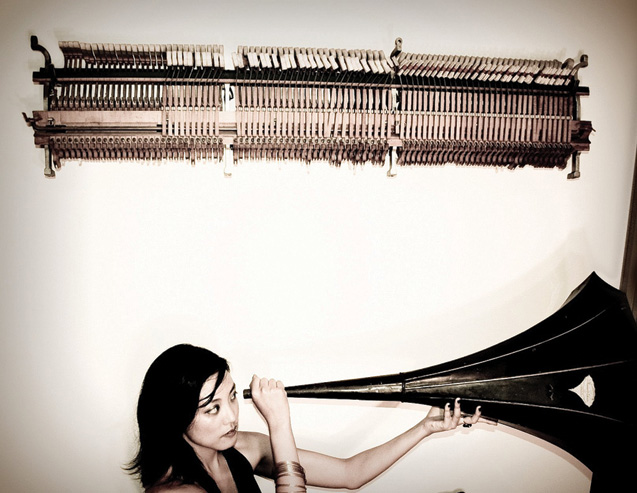Bora Yoon’s compositions use everything around her—an old cell phone, a viola, the layout of a building—to create immersive, one-of-a-kind experiences.
by SUEVON LEE
For most people, a car horn, a racquetball game or beeps on a cell phone may not sound like much more than just that. To Bora Yoon, who has perfect pitch, they are musical building blocks.
“All the stuff I do sound-wise, honestly, is because I’m a big music nerd,” said Yoon. “I just look for pitches. When I hear car honks, I’m like, ‘Oh, that’s an A and an F sharp.’”
What she’s been able to do with those tones has been far from ordinary. Innovative, pushing-the-envelope and original, yes. It’s not just anyone who can weave in such seemingly disparate elements as Tibetan bowls, bells, chime sticks, medieval chants, traditional Korean drums and voicemails from one’s mother into an album. And still make it sound congruous.
As a sound artist, vocalist and composer, Yoon finds inspiration in her physical environment. The Korean American musician, has created what she calls “site-specific” work, designed and performed in nontraditional performance spaces. Past pieces have been staged everywhere from an abandoned pool in Brooklyn, where sopranos sang choral music while riding on bicycles to create sliding harmonies, bent by the Doppler effect; to a Frank Gehry building, where Yoon produced a sound score for dancers who writhed, pranced and flipped on the side of the Fisher Center at Bard College in Annandale-on-Hudson, New York.
For her latest work, the 33-yearold Yoon turned inward instead.
“I was trying to push my boundaries into making something not just beautiful but that showed the entirety of one’s inner world,” Yoon said of her new album, Sunken Cathedral, released in mid-April by independent
record label Innova Recordings. “I forced myself to go to the really uncomfortable places and show them.”
The New York-based Yoon says the five-year-long effort was meant to fuse together her various musical and cultural identities and to articulate her thoughts on the intersection of sound and space. It also addresses themes of loss and acceptance, including the death of Yoon’s father, who passed away when she was 12.
“I really feel that, for five years, I went down to the bottom of the ocean and almost died about five times and came up with this thing that I’m really excited I finally have,” she said. “I may have the bends, but I do feel very, very lucky that, in this lifetime, I’ve been able to make something as meaningful as this record has been.”
The album is a compilation of soundscapes, lyrics and songs drawn from both traditional and modern sources, including medieval chant by Saint Hildegard von Bingen to voicemails from Yoon’s mother in a track called “Jansori Pansori,” a rhyming play off the name of the old folkloric musical tradition and the Korean word for lighthearted nagging.
Yoon performed the album on stage at New York’s Asia Society in April, accompanied by traditional Korean drummer and dancer Vong Pak, as a projector screen displayed images of artist U-Ram Choe’s kinetic sculptures.
The album is part of a yearlong release that includes interactive music videos, a limited-edition LP and a live theater performance to debut January 2015.
Yoon grew up just outside Chicago in Northbrook, Illinois. Yoon’s parents are both from the Jeolla province in South Korea, where pansori stems. She credits her mother, Yuni Yoon, with teaching her you “don’t throw away anything that has some value.”
“All of my foundation of what I do stems from what she taught me,” Yoon said. “The ability to be resourceful and creative within the limitations you have—that’s exactly how other artists survive.”
From a young age, Yoon gravitated to music. She could pick out a tune on the piano from age 5 and started Suzuki violin lessons at age 7. She said choral music became her first musical love, though, and she displayed an early talent for it.
“Her voice, particularly, I noticed pretty much right away,” said Susan Young, Yoon’s middle school choir teacher. “It is a beautiful, clear, almost boy-choir type sound, which is unusual.”
Yoon went on to study music and creative writing at Ithaca College before moving to New York City. Her incorporation of a Samsung 2004 E-105 flip cell phone in her work led to a Samsung commissioned project called “Phonation” that debuted at Lincoln Center in 2007 and the filming of a commercial for Samsung Anycall’s “Talk Play Love” advertising campaign.
That experience, Yoon recalls, was as jarring as it was thrilling.
“It was really exciting, but all of the Korean expectations and Korean culture that I had avoided all my life kind of came back with a vengeance all at once,” she said.
She recalls being told by Korean producers to change her hairstyle, remove a lip ring and her silver nail polish before the shoot—essentially scrubbing away the individual to present a more sanitized version of herself.
“I remember just sitting there at the first business meeting and thinking, ‘They don’t actually want me, they just want what I do,’” she said. “I smiled and nodded and was pleasant about it. It was a huge thrill and a great ride.” But she added, “I couldn’t imagine two cultural identities that were further apart, when I think about the values of Korean culture and etiquette.”
Yoon’s work as a sound artist is only one part of her musical identity. She sings in the acclaimed choir ensemble at The Church of the Ascension, an Episcopal church in New York’s Greenwich Village. She is also a 2014 TED fellow, and this fall, will start a five-year long doctoral fellowship in musical composition at Princeton University, where she wants to create a performance interface with gesture controllers such as Xbox 360 sensors.
“What I’m doing is storytelling through sound and objects and gesture and visuals. It’s what is being said between those elements that’s the story,” Yoon said. “It really has been an archetypal journey for me as an artist, to heal the very disparate musical and cultural identities that I have into a single place.”
Listen to Bora Yoon’s performance of “Jansori Pansori” here.
And here’s Yoon at TED2014:
(Top photo by Lynne L. Herrera)





